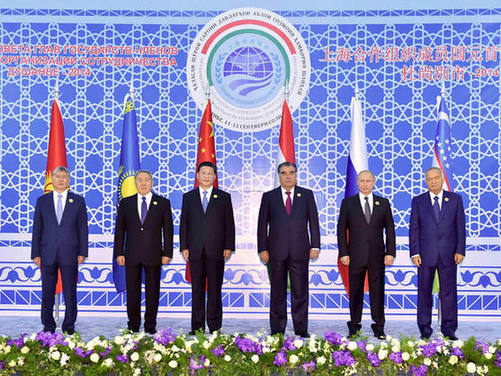Deeper SCO Cooperation Promises Regional Peace and Development
By LI LI
Leaders of the Shanghai Cooperation Organization (SCO) member states gathered on September 11 and 12 in Dushanbe, capital of Tajikistan, for a summit that is set to chart the course of the regional group’s development for the next decade.
|
 |
|
Chinese President Xi Jinping meets with other leaders of the Shanghai Cooperation Organization (SCO) at its 14th summit in Dushanbe, Tajikistan. Xinhua |
It is particularly notable that the leaders are expected to endorse a series of legal documents that will pave the way towards the much-expected SCO expansion, infuse fresh vigor into the group’s future development, and boost its influence and appeal in the international arena.
The anticipated achievement will testify to the rest of the world that the SCO is a truly open and equal platform for safeguarding regional peace and development, and not an exclusive and ambitious China-led “military alliance,” as portrayed by some Western powers.
Indeed, that the SCO was named after a Chinese city intimated that China, the world’s second largest economy, would play a leading role in the group.
However, certain commentators in the West should be reminded that leadership is not synonymous with dominance. All SCO members share equal rights in the bloc and have for years striven for their common aspirations for regional peace, common development and a more balanced international order.
“SCO members have created a new model of international relations — partnership instead of alliance,” wrote Chinese President Xi Jinping in an article published in a Tajik newspaper prior to his attendance of the SCO summit.
Founded in 2001, the SCO groups China, Kazakhstan, Kyrgyzstan, Russia, Tajikistan and Uzbekistan, covering about three-fifths of the Eurasia land mass and accounting for 14.9 percent of the global economic output.
In the beginning, these Eurasia neighbors were brought together by their shared quest to tackle the dire security situation in this region.
Northwest China and part of the Central Asia are troubled by “three evil forces” — terrorism, separatism, and extremism. Drug trafficking and transnational organized crimes run rampant in Afghanistan and Pakistan. A barrage of other unconventional security menaces are also piling up in such fields as finance, information, food, and environmental protection.
